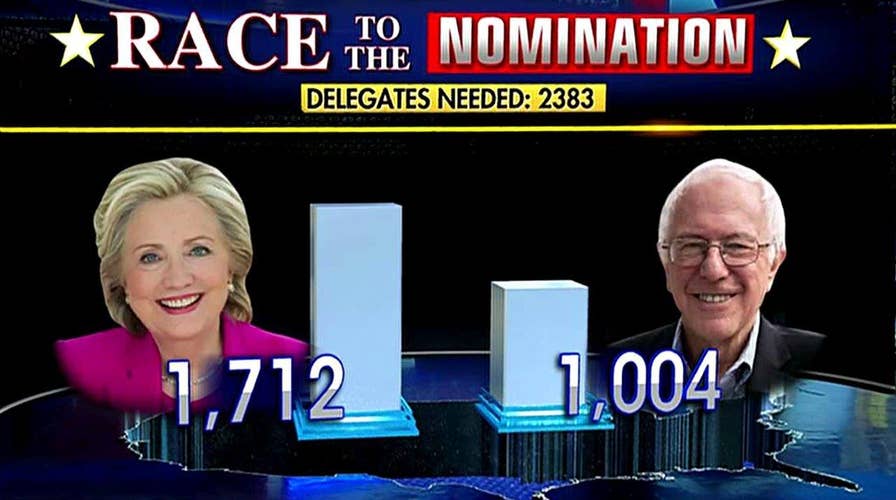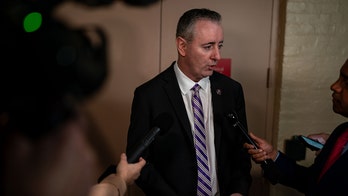DNC downplays role of superdelegates in Democrat primary
Communications director says voters will determine nominee as Sanders tries to court Clinton's delegates
Bernie Sanders’ campaign, buoyed by recent victories, is mounting a late-stage bid to court so-called superdelegates and wrangle just enough of the influential party insiders to close the gap with Hillary Clinton heading into the Democrats’ presidential convention.
Like essentially every other Sanders strategy at this point, it’s an uphill and longshot play.
Campaign officials acknowledged Monday that the Vermont senator, despite his weekend caucus sweep and other wins, cannot secure the nomination without moving the needle on superdelegates – who are elected officials and others free to support whomever they want.
Top Sanders adviser Tad Devine argued the delegate count will be so close that neither Clinton nor Sanders could win the nomination with pledged delegates alone.
“That’s mission impossible,” he said.
So as the Sanders campaign continues to “compete and compete fully,” as Devine put it, in the remaining primaries and caucuses, the underdog team is looking to line up support from superdelegates who remain undecided or aligned with the front-running Clinton.
Devine said dozens of superdelegates have expressed support for the Vermont senator. He acknowledged delegates who are undecided – as opposed to those already backing Clinton – are the “best target.”
Campaign manager Jeff Weaver also suggested the number in the pro-Sanders camp is “higher than what’s publicly available” because others are “not ready to go public yet.”
The leaderboard right now still reflects a daunting road ahead for Sanders.
Clinton leads Sanders in the pledged-delegate race 1,243-975. That gap grows immensely when superdelegates are included; 469 currently support Clinton, while Sanders only has 29 in his corner.
It takes 2,383 total delegates to win the nomination.
Even as Sanders claims momentum out of his Western state victories this past weekend, the Clinton campaign is voicing confidence that the race could be over in a matter of weeks.
“We are going to get to the point where, at the end of April, there just is not enough real estate for him to overtake the commanding lead that we’ve built up,” Clinton pollster Joel Benenson told reporters, according to the Los Angeles Times.
Weaver, though, said the Sanders campaign is in regular contact with at least some of the roughly 200 still-available superdelegates, an effort that includes recently sending them a newsletter and having those committed to Sanders making calls to the undecided.
The campaign is not alone in such efforts. The remaining three GOP presidential candidates are in a furious, behind-the-scenes battle for delegates who -- more likely than for Democrats -- could decide the nominee at the July convention. They are eyeing both delegates who backed ex-candidates and those who could become unbound at a contested convention.
Front-runner Donald Trump on Tuesday named as his convention manager Paul Manafort, a political veteran who helped then-President Gerald Ford in his convention floor fight in 1976.
Ohio Gov. John Kasich has enlisted four veterans: Stu Spencer and Charlie Black, both Reagan advisers, and this week operatives Michael Biundo and Andrew Boucher, to win over delegates.
In addition, Texas Sen. Ted Cruz reportedly is going to the Colorado state convention next week, when a majority of the state’s delegates will be picked. And Trump is disputing the delegate allocation in Louisiana’s March 29 primary, where he reportedly could get fewer delegates than second-place finisher Cruz despite winning the state.
The Sanders campaign has a superdelegate point person, though it’s unclear how aggressive their wooing operation will be.
Sanders Press Secretary Symone Sanders told FoxNews.com on Tuesday the campaign has somebody on staff to keep in contact with superdelegates.
“But no, we don’t have anybody picking off folks,” she said.
On Monday, Sanders pollster Ben Tulchin said an “overwhelming preponderance” of polling data shows that his candidate would fare better in a general election than Clinton against any of the three GOP candidates.
“This is not a blip,” he said.
Tulchin also said Sanders is “very popular” among independent voters who are “absolutely critical for Democrats to win the White House in November.”
And he made clear that the polling details are targeted to more than just reporters and voters.
“These are things that superdelegates, quite frankly, have to consider quite seriously,” he said.





